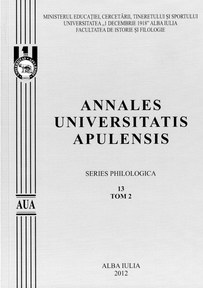O`Neill`s Reception Studies in Europe: Recent Contributions from Ireland and Romania
O`Neill`s Reception Studies in Europe: Recent Contributions from Ireland and Romania
Author(s): Adriana Carolina BulzSubject(s): Literary Texts
Published by: Universitatea »1 Decembrie 1918« Alba Iulia
Keywords: reception studies; Eugene O’Neill criticism; audience response; cultural dialogue; transatlantic connections
Summary/Abstract: In my paper, I intend to contrast the approaches of two reception studies volumes dedicated to presenting the impact that O’Neill’s theater had on two European audiences in the 20th century – the Romanian and the Irish one. I will analyze the unique contribution brought by Mariana Rodica Pioariu’s study, Dramaturgia Americană în România: Eugene O’Neill, Arthur Miller, Tennessee Williams (2004), a volume which approaches O’Neill’s work from a triple perspective – criticism, performance and translation. From this viewpoint it is more comprehensive and rigorous than Eduard Shaughnessy's Eugene O'Neill in Ireland: The Critical Reception (1988), a volume that focuses only on drama criticism and performance. Serving to frame my discussion of the reception studies approach, Liu and Swortzell’s Eugene O'Neill in China: An International Centenary Celebration (1992), dwells on the implications of O’Neill’s impact on a worldwide scale. The paper also attempts to use the above-mentioned studies and collections of essays in order to attempt a definition of a type of critical focus that has been less well-defined, namely the category of “audience-oriented” studies – which includes public reception, individual response as well as a hermeneutics of the text in its various hypostases (as transformed through critical reading, translation and staging by various individuals or artistic teams). The corollary of such an approach is an emphasis on cultural connections and dialogue, usually achieved through an explanation of the context into which the respective work is placed, and depending upon the individual flair of the scholar that tackles a material rather difficult to master – various editions of the plays in translation, critical articles scattered in the press of the time, and age-worn reviews of past performances. Ultimately, a focus on reception activates the resources of cultural memory in a mutually benefitting enterprise - for the author analyzed as well as for the audience, revealed in its picturesque historical manifestations, but it can prove a daunting task for the scholars – who deserve all the more praise if their analyses are sound and consistent.
Journal: Annales Universitatis Apulensis. Series Philologica
- Issue Year: 13/2012
- Issue No: 2
- Page Range: 89-100
- Page Count: 11
- Language: English

